Key takeaways:
- Establishing clear boundaries and communicating needs is essential for a healthy work-life balance.
- Identifying and aligning actions with core values, such as family and personal growth, leads to a more fulfilling life.
- Regularly evaluating and adjusting commitments helps maintain balance and address any emerging pressures or changes in priorities.
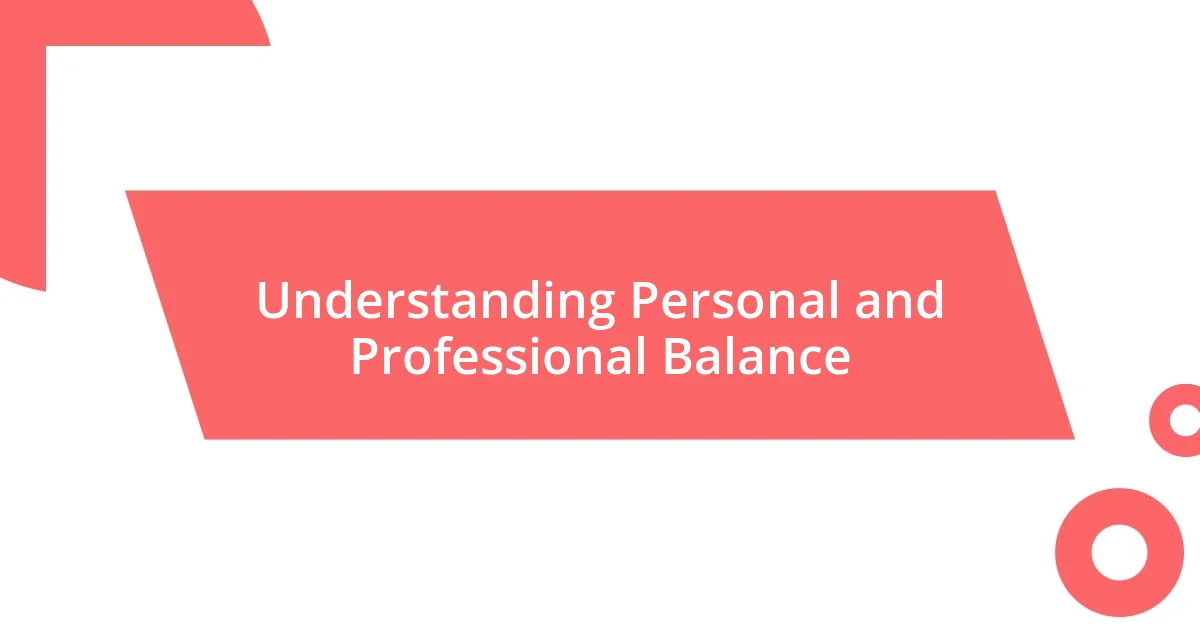
Understanding Personal and Professional Balance
Finding the right balance between personal and professional life can sometimes feel like walking a tightrope, doesn’t it? I recall a time when I found myself working late hours, justifying it by thinking it was for the greater good of my career. Yet, I was sacrificing treasured moments with my family. It wasn’t until a close friend pointed out the little things I was missing—like my daughter’s soccer games—that I realized how crucial this balance really is.
From my experience, establishing boundaries is vital to maintaining this harmony. I’ve learned to turn off work notifications at dinner, which allows me to fully engage with my loved ones. It’s surprising how a small change can significantly impact your mindset. Have you ever considered how your personal life influences your professional effectiveness?
Communication plays an essential role, as well. I remember when I was upfront with my boss about my need for flexibility, sharing how it would enhance my productivity. To my surprise, not only did they appreciate my honesty, but they also respected my commitment to maintaining that balance. It reinforced my belief that understanding and articulating your needs can lead to a healthier work-life integration.

Identifying Your Core Values
Identifying your core values is a fundamental step in maintaining balance between your personal and professional life. I vividly remember sitting down one weekend, feeling somewhat lost, and making a list of what truly mattered to me. It was an eye-opening experience, as recognizing my core values—like family, integrity, and personal growth—helped me make more intentional decisions that aligned with who I am.
- Family: My loved ones always come first, reminding me of why I work hard.
- Integrity: I believe in being truthful to myself and others, which affects how I conduct my work.
- Personal Growth: Continually learning keeps me motivated and ensures I’m at my best in both spheres.
When I align my actions with these values, I feel more fulfilled, both at home and at work. It’s almost like having a compass that guides me through the chaos of daily life.
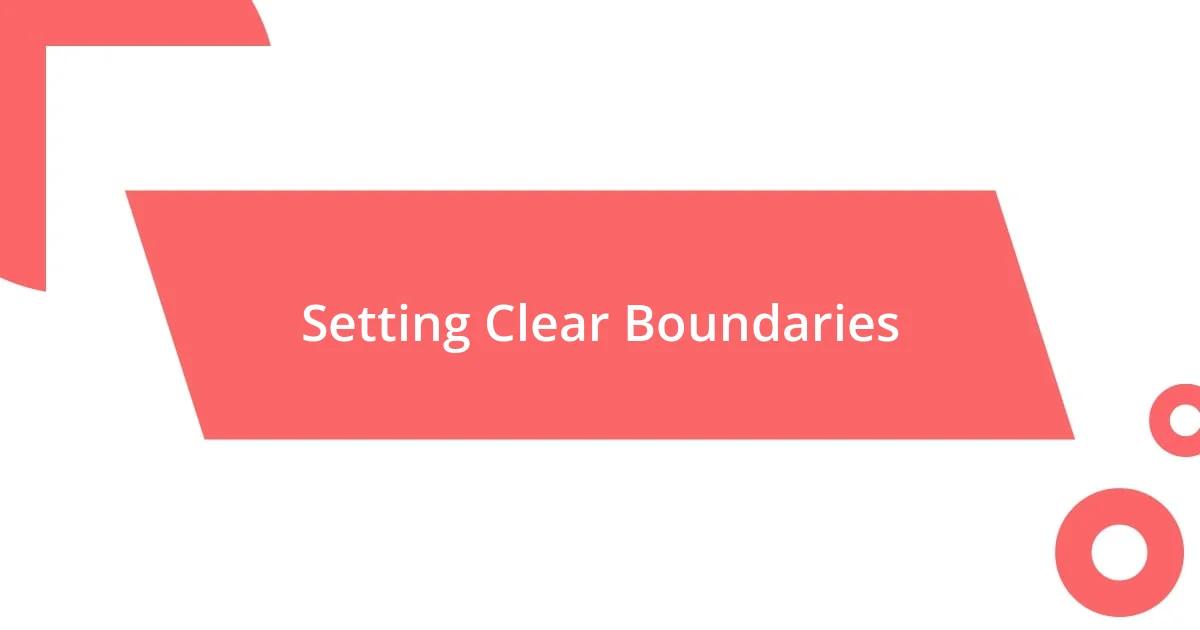
Setting Clear Boundaries
Setting clear boundaries is crucial for both personal and professional well-being. I’ve often found that people have different perceptions of what availability means, especially in today’s connected world. For me, it became essential to establish specific times when I was fully off the clock. I remember things got stressful when my boss sent emails late in the evening, expecting immediate responses. Once I decided to communicate my availability clearly, I felt empowered. It not only reduced my anxiety but also set precedent for my colleagues to respect my personal time.
In another instance, I once participated in a group project that demanded constant communication via chat. As exciting as it was, I realized that the incessant pinging during my personal hours was disturbing my peace. So, I proposed designated hours for discussions. Surprisingly, my teammates were relieved, too. They were dealing with the same pressure of needing space for life outside work. This experience taught me that boundaries are not just personal—they’re about creating a shared understanding that benefits everyone.
Establishing these boundaries doesn’t come without challenges. There were moments I felt guilty for saying no to extra work or socializing with colleagues after hours. However, I gradually recognized that when I prioritize my needs, I’m better equipped to contribute positively in professional settings. It’s a game-changer realizing that taking time for myself enhances my productivity and mental health.
| Professional Boundaries | Personal Boundaries |
|---|---|
| Defining work hours | Establishing ‘me time’ |
| Limiting after-hours communication | Communicating availability to family and friends |
| Respecting personal workflow | Engaging in hobbies or relaxation |
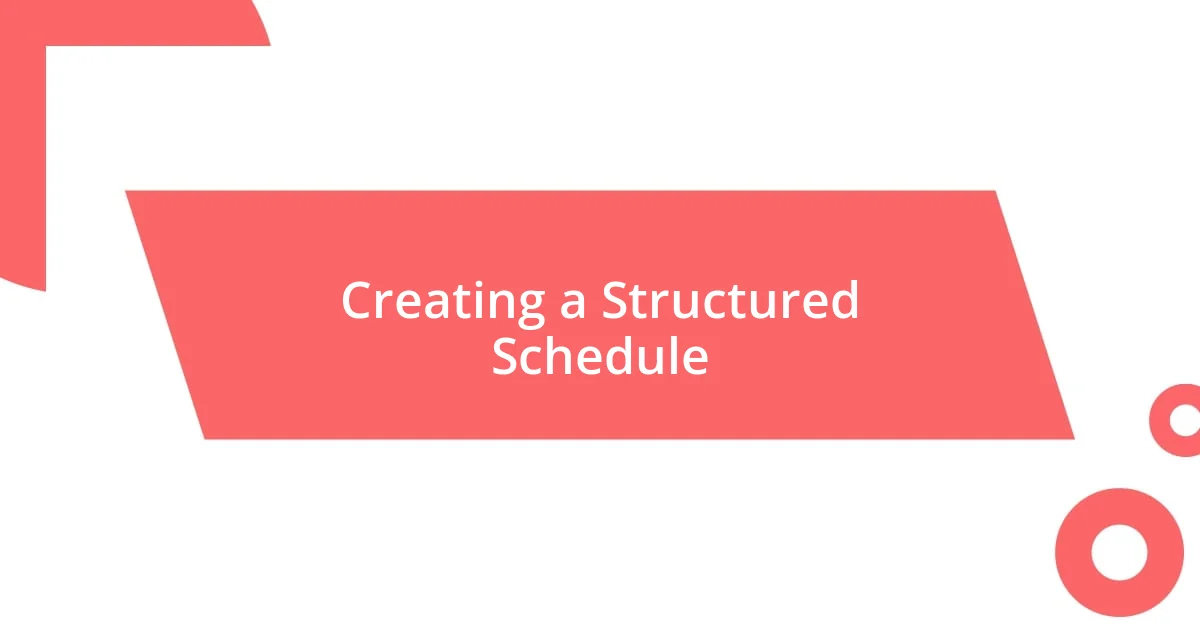
Creating a Structured Schedule
Creating a structured schedule is vital for me to manage my personal and professional life effectively. I design my weekly planner not just with tasks, but with moments that feed my soul. For example, I block off Sunday afternoons as a dedicated family time. That simple act of scheduling has turned into my cherished ritual, reminding me that it’s okay to step away from work celebrations and focus on what truly matters.
I often use color coding in my calendar to differentiate between work commitments and personal time. Initially, I thought it was a frivolous approach, but I’ve found it helps me visualize my week better. This way, when I glance at my schedule, I can instantly see if I’m dedicating enough time to self-care or family activities. It’s all too easy to let work spill over into every nook and cranny of life, right? I believe a structured schedule creates a form of accountability, nudging me back on track when I stray too far into work mode.
Every so often, I find myself overwhelmed with the demands of daily life. That’s when I pause and reevaluate my schedule, asking myself: Are my priorities still aligned? One particularly hectic week, I realized I had crammed too many meetings and not enough downtime, leading to burnout. Adjusting my schedule, I learned to leave gaps for spontaneity and rest. It’s worth reminding ourselves that while structure is crucial, flexibility is just as important in maintaining that ever-elusive balance.
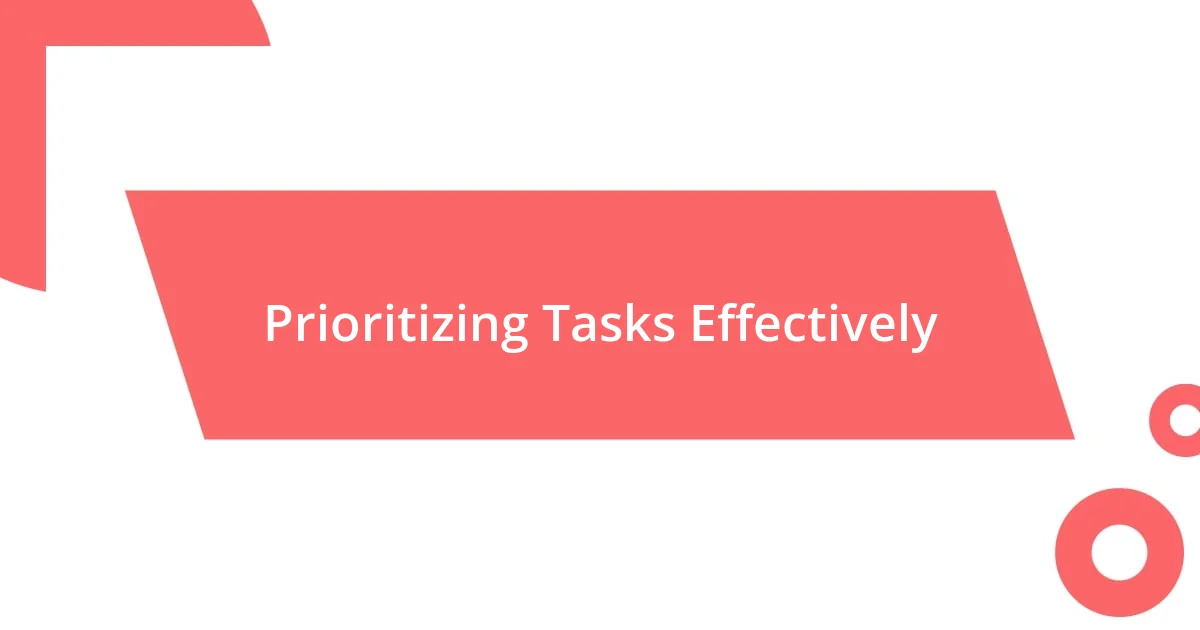
Prioritizing Tasks Effectively
Prioritizing tasks effectively makes all the difference in navigating my busy life. When I first started using a priority matrix—a simple tool that helps categorize tasks by urgency and importance—things changed dramatically. I recall a week when I had back-to-back deadlines and an unexpected family event came up. The matrix helped me see that some tasks weren’t as crucial as I thought, allowing me to focus on what truly required my attention. It’s a lifesaver for sifting through the noise.
I often find myself at a crossroads when deciding what to tackle first. Take, for instance, a day when I had to prepare a big presentation while my child needed help with a school project. Instead of leaving my child to fend for themselves, I decided to combine efforts. I used our time together to explain my presentation while engaging them in their project. This showed me that sometimes, it’s not just about prioritizing tasks at face value, but finding creative ways to integrate responsibilities.
Regularly reviewing my objectives also helps me keep my priorities in check. I made it a habit to sit down on Friday evenings and evaluate what I accomplished that week. Reflecting on my progress has opened my eyes to how I spend my time. I once felt overwhelmed by unachievable to-do lists, but by celebrating small wins, I realized that each little task contributes to my larger goals. How do you reflect on your week? This practice seems to strengthen my focus and motivation as I step into a fresh week ahead.
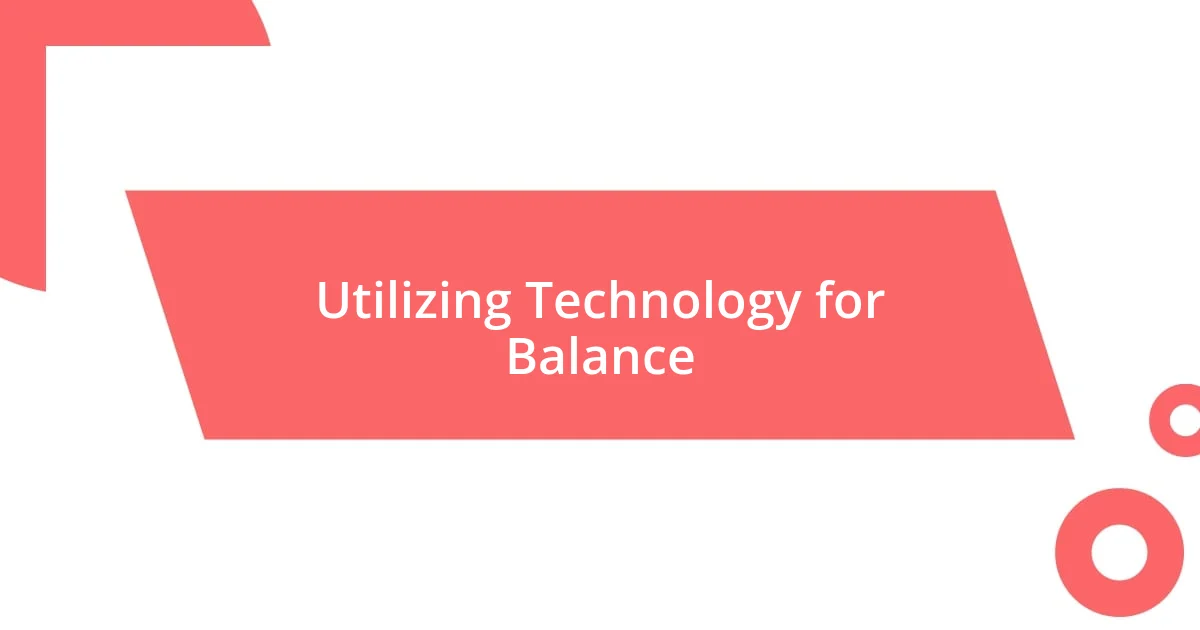
Utilizing Technology for Balance
Technology has played a pivotal role in finding my balance between personal and professional life. Using apps like Todoist and Trello not only helps me manage my tasks but also allows me to set reminders for personal commitments. I still remember one evening when I almost forgot a friend’s birthday dinner because of work deadlines. A simple alert from my calendar app saved me, reminding me to put down my laptop and celebrate. This little tool transformed what could have been a missed connection into a cherished memory.
Moreover, I find that integrating time-tracking software into my routine has been a game changer. At first, I was skeptical about tracking my screen time; however, the insights I’ve gained are invaluable. One month, I discovered that I was spending an overwhelming chunk of my evenings scrolling mindlessly through social media instead of engaging in activities I love, like reading or cooking. With this realization, I adjusted my daily tech-use boundaries, and suddenly my evenings transformed from static to stimulating. It’s amazing how a bit of self-observation can catalyze positive changes!
Lastly, I’ve embraced the power of video calls to maintain relationships while navigating my busy schedule. Balancing Zoom meetings with family catch-ups seemed challenging initially, but I discovered that scheduling virtual dinner dates kept our bonds strong. Looking back, I recall a heartwarming chat with my parents that happened right after a long work week. Their faces on the screen reminded me of the importance of connection. What small changes could you make to strengthen your connections using technology? I believe these moments remind us that technology, when harnessed wisely, can enrich our lives instead of overwhelming us.
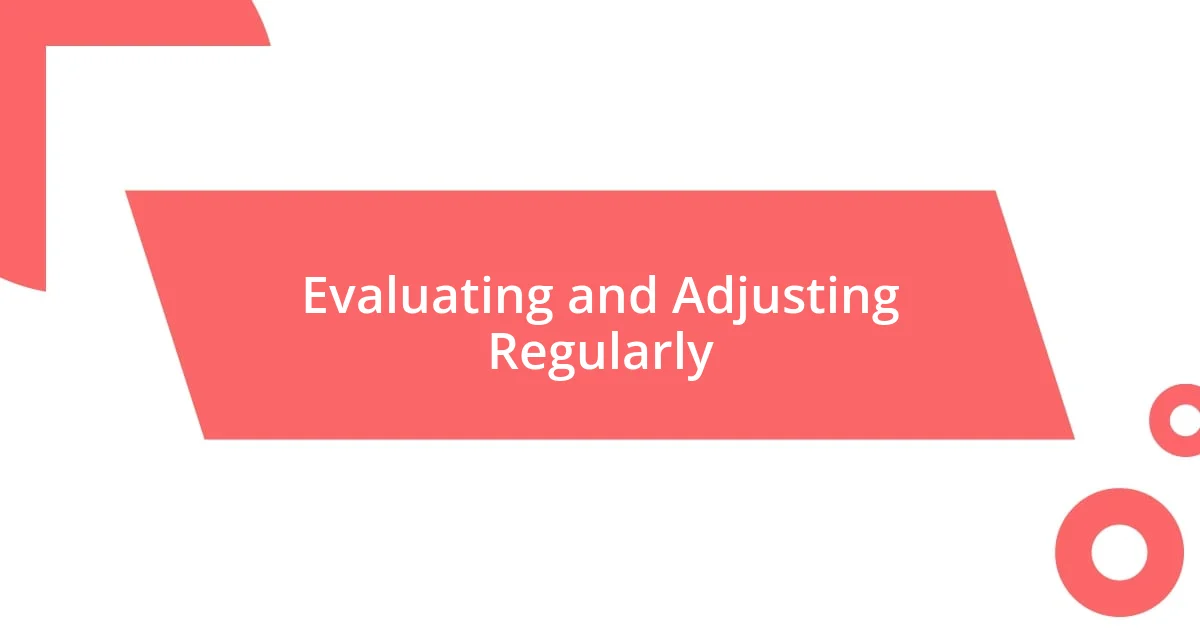
Evaluating and Adjusting Regularly
Regular evaluation of my personal and professional balance is something that I take seriously. At the end of each month, I sit down with a cup of tea and reflect on what worked and what didn’t. This ritual not only helps me reassess my priorities but also cultivates a sense of calm amidst my busyness. Have you ever taken a moment to pause and give yourself that space to think? I find that this practice brings clarity, revealing patterns that I might otherwise overlook.
The process of adjusting my commitments comes next, often inspired by my reflections. For instance, I once realized I was overcommitting to social events at the expense of family time. After feeling the stress build up one weekend, I decided to prioritize home-based activities, like family game nights. Not only did this bring my family closer, but it also infused my weekends with joy rather than exhaustion. Isn’t it fascinating how recognizing our limits can lead to more fulfilling experiences?
I also keep an eye out for external factors that might necessitate changes. Recently, a shift in workload at my job caused me to rethink my daily schedule. Instead of cramming tasks into every hour, I started blocking out specific time for personal projects, like gardening. It amazed me how something so simple could break the monotony of my workweek. Have you ever adjusted your routine in response to unexpected changes? I believe that finding this flexibility keeps my overall well-being in check, ensuring that I don’t lose sight of what truly matters.















